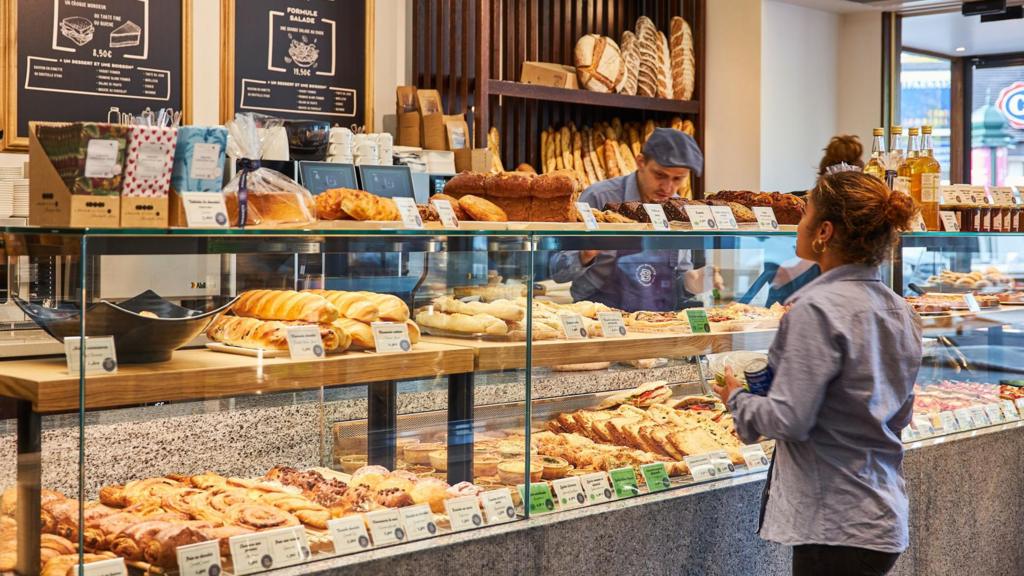Descend into the basement level of any major Singaporean shopping mall, and the aroma of freshly baked goods will likely greet you.
Long queues consistently form at Korean, Japanese, Taiwanese, and Singaporean bakeries. Customers, tongs in hand, carefully select from an array of cream rolls, milk breads, croissants, and fruit pastries displayed in brimming cabinets.
Paris Baguette, with its name clearly inspired by the French capital, employs tricolor decor, Eiffel Tower signage, and an ambiance reminiscent of a Parisian café.
However, its origins are distinctly Korean.
“I wouldn’t limit our bread solely to French influences. We are a global brand,” explains Jin-soo Hur, President and CEO of SPC Group, Paris Baguette’s parent company.
“Take croissants, for instance; are they exclusively European? I’d argue they’re universal.”
SPC’s history stretches back 80 years to a small family bakery. Now a major player in South Korea’s mass-produced bread and pastry market, it employs 20,000 people across its various brands, reporting sales of $5.6 billion (£4.26 billion) last year.
Established in 1988, Paris Baguette was the first Korean bakery to expand internationally, opening in China, a market that remains significant. Today, it boasts 4,000 stores across 14 countries, spanning Asia, Europe, and the US.
Paris Baguette’s ambitious international expansion plans include opening over 1,000 new branches globally by 2030, with a strong focus on the US market.
A new Texas facility, slated for completion in 2027, will become its largest overseas production site, supplying the US, Canada, and Latin America.
For Mr. Hur, conquering the American market is paramount, representing a significant milestone in the company’s global success.
Strategic sports partnerships play a crucial role in Paris Baguette’s strategy. A current collaboration with English Premier League club Tottenham Hotspur follows a similar two-season deal with Paris Saint-Germain, providing baked goods and desserts at home games.
“Food is culture. Sports bring large crowds to stadiums, and London has a fantastic atmosphere,” Mr. Hur notes.
While Son Heung-min, captain of both South Korea’s national team and Spurs, recently led his team to Europa League victory, Mr. Hur emphasizes that the partnership transcends nationality.
Tottenham is a “top club, and Paris Baguette aims to be the best in its class,” he states.
Mr. Hur acknowledges the challenges of traditional hand-kneading, highlighting the company’s system of delivering frozen dough to franchises worldwide to enhance efficiency and extend shelf life.
Asia’s rich baking heritage is complemented by the growing demand for convenient on-the-go foods driven by rapid urbanization and changing lifestyles. Bakeries throughout the region offer a diverse range of products.
Alongside staples like pain au chocolat and sandwiches, Asian-inspired flavors—pandan, durian, salted egg, red bean, and matcha—are prevalent in croissants and pastries.
Paris Baguette caters to this demand through a halal-certified Malaysian plant, supplying Southeast Asia and the Middle East.
Leveraging the global fascination with Korean culture, experts foresee further success for Asian bakeries. Saverio Busato, a pastry chef at the Culinary Institute of America in Singapore, comments:
“Korean and Japanese culture’s global popularity means people see these products on screen and are more inclined to try them. I recently returned from Italy, surprised to find numerous Asian bakeries there—a positive sign.”
However, the quality of frozen dough versus artisanal baking remains a key question.
A blind taste test with Chef Busato reveals a less-than-favorable assessment of a frozen-dough croissant: “It’s quite bad. Hollow, lacking butter profile, gluey, and dense.”
Chef Busato acknowledges the limitations of mass production, conceding that frozen dough is often necessary for large-scale operations.
Conversely, a Korean milk bread receives high praise: “Fantastic. Fluffy, refreshing… reminiscent of childhood snacks.”
The cost-of-living crisis, particularly US inflation, poses a significant challenge for Paris Baguette’s US expansion. Mr. Hur notes that many companies are adapting to maintain profitability.
Competitor Pret A Manger’s struggles, including outlet closures and job cuts, highlight the economic pressures facing the industry.
While acknowledging the global economic climate, Mr. Hur emphasizes that profit isn’t his sole objective. “If profit were our only goal, we’d remain in Korea,” he says. “We aim to transform global bread culture and continue expanding—beneficial for both my country and the world.”

